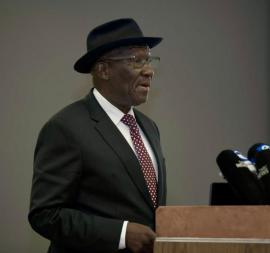
The Inter-Ministerial Committee (IMC) on Political Killings in KwaZulu-Natal has urged political parties to strengthen their internal mechanisms in order to defuse inter- and intra-tensions and instability, which may escalate and lead to political attacks and killings.
Addressing media on Wednesday following the committee’s meeting in Durban, Police Minister and IMC chairperson, Bheki Cele, said as the country gets closer to the National General Elections next year, efforts are being solidified to boost the work of the IMC, as well as investigations.
“In enhancing the work of the task team, the IMC has resolved that there will be dedicated courts to speedily prosecute these matters,” Cele said.
The IMC -- which consists of the Ministers of State Security Agency, Defence, Justice and Correctional Services and Police -- remains committed to encouraging political tolerance by individuals and parties, whether before, during or after the election period.
Cele said through the integrated work of the task team, the IMC is committed to arresting those who use violence to settle political scores.
The task team includes the South African Police Service (SAPS), National Prosecuting Authority (NPA) - supported by the State Security Agency and Correctional Services, the KwaZulu-Natal Premier, and KZN Community Safety and Liaison MEC.
Progress on cases
Giving the latest developments around the investigation of politically linked violence in KZN, Cele said since 4 July 2018, a total of 321 cases have been investigated.
Cele said the cases under scrutiny by the team include 155 cases of murder; 51 attempted murder, 77 intimidation, 12 cases of conspiracy to commit murder and 26 other ad hoc cases.
“So far, the work of the task team has resulted in the arrest of 348 suspects, who have already been charged on 233 cases. Sixty-two suspects have been convicted, while 155 are going through the court processes. Seventeen arrested suspects have since died during the court processes,” Cele said.
Cele noted that firearms are the most used weapon in the majority of the attacks on councillors, office bearers and municipal officials.
He said the team has recovered 46 firearms from suspects, which are linked through ballistics to multiple political murder cases before the task team.
In a continuous effort to reduce political killings and at same time, reduce the proliferation of firearms within the province of KwaZulu-Natal and country at large, Cele said the task team is also investigating parallel cases that are not related to the task team’s mandate but are linked with politically related cases with similar suspects and ballistic analysis.
He said 85 such cases have so far been registered, and efforts to rid the streets of illegal firearms do not end here.
Over and above these parallel cases, Cele said the team continues to conduct intelligence driven operations, targeting unlicensed firearms, which has resulted in 86 cases being registered in this regard.
“The task team is conducting intelligence driven operations targeting the possession of unlicensed firearms, which has resulted in 172 cases. Over 250 unlicensed firearms have been taken off the streets through police operations,” the Minister said.
Region stabilisation
Cele said since the implementation of an integrated multi-disciplinary investigation approach, eight of the province's 11 regions have since stabilised.
However, he said, the eThekwini Metropolitan remains an area of concern, and the focus is now on the region to bring much needed stability.
“The IMC is encouraged that interventions are in place to deal with all forms of politically related crimes, proactively and reactively in the eThekwini and in the Zululand District.”
Political killings
The investigations of the political killings revealed that the most affected political parties are the African National Congress (ANC), Inkatha Freedom Party (IFP) and National Freedom Party (NFP), with 52 murder cases of councillors, including 31 councillors from the ANC, 14 from the IFP, and four from the NFP.
“While 52 councillors have been gunned down since 2011 to date, alarmingly 103 officials working within municipalities as political office bearers and officials in political offices were killed.
“Causative factors for these crimes are linked to intra-political conflicts, with a few cases linked to other motives, such as taxi violence, domestic related issues, business competition and traditional leadership competition, as well as family feuds.
“Murder cases that were reported before the 2016 and 2021 Local Government Elections were mainly as a result of fighting over councillors’ positions; where candidate councillors were eliminated.
“The majority of the murder cases reported after the 2016 and 2021 Local Government Elections were associated with infighting within structures and municipalities over positions,” Cele said.
High profile cases
Sentences handed down in high-profile cases include:
• Mfanafuthi Zulu (notorious hitman): found guilty and sentenced to a total 10 years imprisonment for the murder of ANC Member Bongani Mhlongo.
• Kingdom Phoswa (hitman): found guilty and sentenced to a total of 18 years imprisonment for the murder of ANC Ward Councillor Njabulo Dlamini.
• Bongekile Ngcwaba and Thuthukani Mzolo: found guilty and sentenced to 20 years imprisonment each for the murder of ANC Ward Councillor Kheyelethu Mngcwaba.
• Ntsazane Mthetiswa, Gutshana Zwelandile, Mcobhoti Aphelile and Ntsethe Bonasile (ANC members): found guilty and sentenced to life imprisonment (25 years each) for the murder of EFF member Sbusiso Mbhobo.
• Mxolisi Mzokhona Gcabashe (hitman): found guilty and sentenced to a total of 28 years for the murder of ANC Councillor Minenhle Mkhize.
• Nkosinathi Mantengu (land grabber): found guilty and sentenced to a total of 36 years imprisonment for the murder of IFP member Philangenkosi Nkundlane and his son Bongani (on three counts).
• Thanda Chamane (hitman): found guilty and sentenced to a total of 42 years imprisonment for the murder of IFP Councillor Mfazo Nzuza (on three counts).
– SAnews.gov.za


